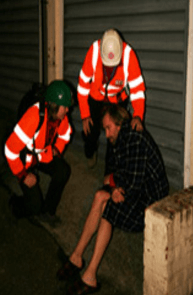 Kent Search and Rescue (KSAR) has developed a new campaign that is targeted primarily at carers and family members of vulnerable people.
Kent Search and Rescue (KSAR) has developed a new campaign that is targeted primarily at carers and family members of vulnerable people.
The Safe and Sound Campaign, which has been running for nearly a year, is intended to encourage carers and families to consider the risks associated with their loved one wandering off and thus to develop workable, cost-effective, proactive strategies to mitigate some of those risks. Besides raising awareness about wandering, KSAR has also developed a number of concrete actions carers can do to prepare for the possibility that the person they care for failing to return home, such as taking a photograph when you change the clocks and filling out a short Life History Questionnaire for use in an emergency. KSAR has even purchased an inexpensive retro instant camera after a carers support group noted that many of their older clients did not have access to a working camera.
Having a loved one go missing, particularly someone you are caring for, can be an extremely traumatic experience not only for the missing person but also for their carer as a result KSAR developed a Life History Questionnaire. This short form, which is designed to be filled out by the carer at their leisure, includes much of the information that the Police or Search Managers request during initial missing persons inquiries, thus alleviating an additional source of stress. This also serves as a great group exercise for carers support groups in the community and serves as an opportunity for search teams to begin a dialogue with carers.
Based on the positive response by the various carers support groups, residential facilities, and social service agencies dotted across Kent as well as the generous support of the Big Lottery Fund, KSAR has been energised to develop this campaign further in the coming years. There are certainly other areas to address including, educating young persons on outdoor survival, working with residential facilities to address wandering, and finally, the ever-contentious issue of electronic tagging. The solutions need not be expensive or even technological as was demonstrated by the “fake” bus stop at the Benrath Senior Centre in Düsseldorf, Germany.

